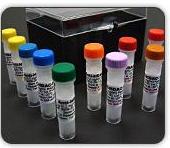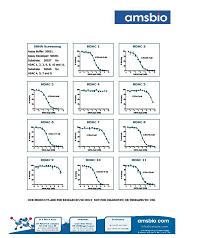Channels
Special Offers & Promotions
Assay Kits for Measuring the Complete Range of HDAC Enzymes
 AMSBIO has announced 2 new histone deacetylase (HDAC) cell-based assay kits that provide an easy tool for studying the activity and inhibition of the full range of HDAC enzymes (1-11).
AMSBIO has announced 2 new histone deacetylase (HDAC) cell-based assay kits that provide an easy tool for studying the activity and inhibition of the full range of HDAC enzymes (1-11).Inhibition of histone deacetylases has been implicated to modulate transcription and induce apoptosis or differentiation in cancer cells. However, screening compounds for HDAC inhibition has traditionally been difficult due to the lack of convenient tools for analysing HDAC activity.
The new AMSBIO HDAC Cell Based Assay Kits provide a fast and fluorescence-based method that eliminates radioactivity, extractions, or chromatography, as are often used in traditional HDAC assays. By using a cell-permeable HDAC substrate in the new assay kits, the activity of various protein lysine-specific deacetylases including HDAC-containing
 complexes can be measured in intact cells in a simple and homogenous manner. The fluorescence of the deacetylated reaction product can be analysed using a plate reader or a fluorometer.
complexes can be measured in intact cells in a simple and homogenous manner. The fluorescence of the deacetylated reaction product can be analysed using a plate reader or a fluorometer.The new assay procedures require only two easy steps, each performed on a single microtitre plate. First, the HDAC substrate, which comprises an acetylated lysine side chain, is incubated with a sample containing HDAC activity. Second, deacetylation of the substrate sensitises the substrate, so that further treatment with the Lysine Developer produces a fluorophore.
Both the HDAC and HDAC class2a assay are well suited for high throughput screening applications. HDAC inhibitors and antibodies together with all 11 active HDAC enzymes are available. Active Sirtuin proteins are also available separately too.
For further information on HDAC Assay Kits please visit www.amsbio.com/datasheets/50033.pdf /
www.amsbio.com/datasheets/50041.pdf or contact AMSBIO on tel. +44-1235-828200
Founded in 1987, AMS Biotechnology (AMSBIO) is recognised as a leading international provider of unique & innovative products & custom services for life sciences research. The amsbio range includes over 23,000 polyclonal & monoclonal antibodies, peptides, recombinant proteins, extracellular matrix, molecular detection reagents, & tissue DNA, RNA, protein & microarray products. Key research areas include: apoptosis, cell invasion & migration, cell signaling, DNA damage, electrophoresis, glycobiology, posttranslational modification & stem cell biology.
Media Partners


